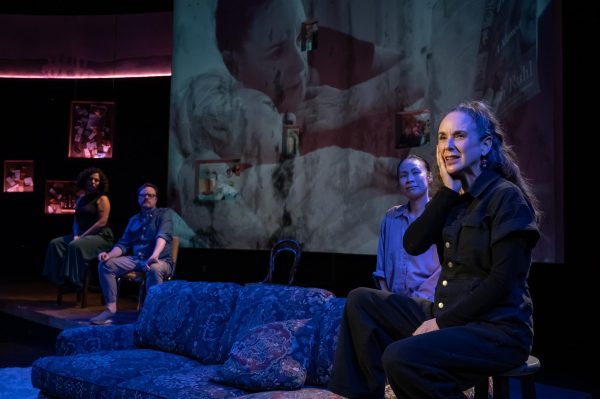A Georgetown University theater professor wrote and directed a play that portrays the depth of care for individuals through art, which performed until Nov. 24.
Derek Goldman, a professor in the department of performing arts, wrote and directed “The Art of Care,” which followed seven stories of care and caregiving in the actors’ own lives, based on interviews with them and with real medical professionals. The play, produced in partnership with the Laboratory for Global Performance and Politics, an initiative that uses performance to center human stories in global politics, and the Mosaic Theater Company, a local Washington, D.C. theater group that focuses on storytelling and social justice, ran from Oct. 31 to Nov. 24, receiving critical acclaim.
Goldman said he wanted the play to humanize stories of care and encourage the audience to consider the importance of care in their lives.
“Care itself is a lens,” Goldman told The Hoya. “The play started by moving people at the heart level, and people were clearly reached and touched there, but I think a lot of them also left galvanized. It’s not a play that gave people a specific thing to do, but I think it did lay the foundations for people to think of care differently in their own lives and their own work.”

“The Art of Care” did not follow a conventional plot, instead acting as a collection of the actors’ own stories, which were told and acted by themselves and combined with historical and political context and the voices of professionals and experts. The script ranged from in-depth narratives of an actor’s experience as a Syrian refugee to historical footnotes about the plague in ancient Athens.
Goldman said he was inspired to focus on care by the importance the actors placed on their own stories.
“People had such intense, moving, intimate, vulnerable stories about their own relationship to care,” Goldman said. “I realized that there was an ‘art of care’ happening in the way people told each other’s stories, and that society often stigmatizes those stories.”
Reginald Douglas (COL ’09), the artistic director of Mosaic Theater and a former student of Goldman, said “The Art of Care” fit with the aims of Mosaic Theater’s goal to tell stories with a lens of justice.
“Realizing that we’re more alike than different is the goal of the theater we’re making at Mosaic,” Douglas told The Hoya. “One of the things the play did so beautifully was think about care as an act of justice and justice as an act of care. Including stories of refugees and people who have experienced racism and sexism grounded the play in the idea that treating one another with respect and dignity and human rights and civil rights is also a way we can care for one another and care for our community.”
Wonnie Kim (SOH ’25), the assistant director, said the production encouraged the actors to have flexibility with their own stories.
“The script was changing every day — it was very collaborative work,” Kim told The Hoya. “The actors, who were sharing their own stories, had a lot of flexibility on what they were comfortable sharing. If the wording wasn’t true to their experience, then they could definitely change that, which is why the script changed so much.”
Goldman said the sense of community the play built was essential to its success.
“Part of the conviction of this piece is that we have these seven amazing artists who are sharing their own and each other’s most vulnerable stories of care, and of course that’s all done with a huge process of building trust and building consent,” Goldman said. “The work is trying to give them agency and ownership.”
Goldman said “The Art of Care” has grown into a greater initiative through partnerships with the Global Health Institute, which supports health education at Georgetown, the School of Health and the Medical Humanities Initiative, which supports work at the intersection of health and the humanities, to expand the mission of the play to other communities.
“We’re continuing the work to bring it into communities and bring people together to share their own stories,” Goldman said. “It’s very empowering when you’ve been feeling isolated and stigmatized.”
“I think that can really allow for change,” Goldman added. “If we sit silently and fearfully, and with a sense of shame and worry about our relationship to care, then we’re going to fail it. But if we can take this energy, there’s really positive things that can come from that.”








